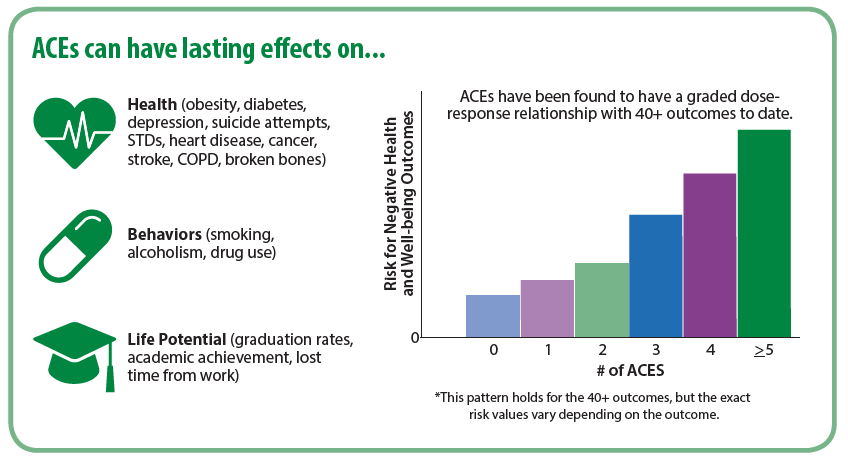IFCI Agrees with the CDC: Childhood Trauma Is a Public Health Issue
Behavioral health providers and public health advocates have long known that adverse early experiences can result in negative health outcomes. Last week, a new, landmark, first-of-its-kind report issued by the Centers for Disease Control and Prevention (CDC) confirmed the public health implications of childhood trauma.
The report issued a stark warning about the long-term impact of exposure to adverse childhood experiences (ACEs) on health, including an increased risk for multiple forms of chronic disease and leading causes of death such as cancer and heart disease. Risk for poor socioeconomic outcomes also was shown to be elevated. This risk was compounded for individuals with higher levels of exposure, and the CDC’s research found that women, American Indian/Alaskan Natives, and Black/African Americans were more likely to experience four or more ACEs.
In Ohio, this issue particularly resonates: a 2016 National Survey of Children’s Health found that as many as 1 in 7 Ohio children had experienced three or more ACEs, higher than the national average. Hallmark ACEs such as parental separation, violence, and poverty are common. Ohio’s prison population is the seventh highest in the nation, with a rapidly increasing female prison population. Ohio is also experiencing high rates of overdose deaths due to the growing opiate epidemic. These instances of parental separation will undoubtedly lead to increased ACEs among our state’s youth.
While the study’s results are harrowing, the CDC’s report emphasizes the significant role of prevention in reducing trauma exposure and improving health outcomes, specifically noting the economic benefits, given the connection of ACEs to education and employment outcomes. The importance of the CDC’s recognition and focus on ACEs and ACEs prevention should not be understated, and lends credence to the many efforts underway to prevent and mitigate and impact of childhood trauma.
As an organization, OhioGuidestone actively seeks to identify ACEs among the individuals we serve through screening throughout our program continuum, and we have adopted a range of trauma-informed practices. In addition, we support our practitioners through a certification process, which includes specialized training and support related to best practices in trauma-informed care. We also partner with multiple health care organizations to support ACEs screening and linkage to care in primary pediatric care. Here at the Institute of Family and Community Impact (IFCI), a trauma-informed lens informs the entirety of our work, including our research, training, and publications.
While increased prevention efforts are necessary at all levels, the CDC report emphasizes the need for policy reforms that support prevention across sectors, including in education, safety-net services, and health. This includes policies that help to strengthen the financial status of families, as poverty is associated with higher risk for exposure to ACEs.
With the growing recognition of trauma's impact on health outcomes, we believe partnerships between the behavioral and physical health systems can yield positive results for children, families, and taxpayers.Click To TweetThe CDC specifically points to childcare subsidies, tax credits, and temporary financial assistance as important to help families maintain financial stability and subsequently can prevent ACEs. In addition, the CDC identifies the need for reforms to promote social norms that can prevent violence, including the need for greater public awareness around childhood trauma and child maltreatment, paired with legislation that can help protect children from corporal punishment. The report also cites the need for increased access to high-quality early care and education, parenting programs that support nurturing relationships, and mentoring opportunities to better prevent ACEs exposure.
At IFCI, other reforms we support to address this issue include policies that better promote cross-sector collaboration. In order to reach the greatest number of children and families with prevention, early identification, and intervention services, public and private entities must have access to tools that allow for improved data sharing, and funding to allow for better integration of services.
With the growing recognition of trauma’s impact on health outcomes, we believe partnerships between the behavioral and physical health systems can yield positive results for children, families, and taxpayers.
IFCI supports the strategies outlined by the CDC, and will continue our commitment to intervene to prevent ACEs at the individual, family, and community levels. Continue to follow our work to stay current on our trauma-informed research, training, and publications!






